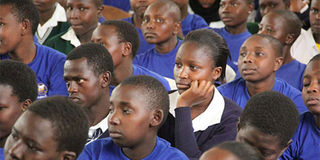Why teachers avoid sex topics in school: Study

Students from various schools follow proceedings during the dissemination of a County Health and Economic Status report in Eldoret on February 21, 2014. A recent study by Unesco revealed that secondary school teachers depict sex as dangerous and immoral to their students. PHOTO |JARED NYATAYA | NATION MEDIA GROUP
What you need to know:
Only one in five students reported learning about contraceptives in school, a new report shows.
In some cases, the report says incomplete and sometimes inaccurate information was taught in schools.
A report by a United Nations (UN) agency has revealed that secondary school teachers in Kenya depict sex as dangerous and immoral to their students.
The Global Education Monitoring Report 2017/2018, which the United Nations Educational, Scientific and Cultural Organisation (Unesco) released Tuesday, shows that only one in five students reported learning about contraceptives in school.
In a study that was conducted in 78 public and private schools, dubbed “Accountability in Education”, gaps emerged on school-based comprehensive sexuality education programmes which are supposed to equip children and young people with knowledge, skills and attitudes.
“While 75 per cent of teachers reported teaching all topics of comprehensive sexuality education programme, only two per cent of students reported learning all topics. Only 20 per cent learned about the different kinds of contraceptives, and even fewer learned how to use and where to get them,” says the study.
INACCURATE INFORMATION
In some cases, the report says incomplete and sometimes inaccurate information was taught in schools.
“Almost 60 per cent of teachers incorrectly taught that condoms alone were not effective in pregnancy prevention. Moreover 71 per cent of teachers emphasised abstinence as the best or only method to prevent pregnancy and sexually transmitted diseases,” says the report.
In the report, more than 65 per cent of students said they wanted to learn how to use contraceptives, 65 per cent said they wanted to know where to get contraceptives, 70 per about sexual and reproductive rights while 70 per cent wanted to learn about female genital mutilation (FGM).
In the report, 15 per cent said they had learned how to use contraceptives, 15 per cent knew where to get contraceptives and 20 per cent about the various kinds of contraceptives.
BARRIERS
About 40 per cent had learned sexual and reproductive rights while another 40 per cent had learned about FGM.
The report says barriers to effective implementation of a comprehensive programme include lack of well-trained teachers, poor support of schools, weak regulations and supervision of policy implementation, opposition from religious and conservative groups and culturally imposed silence about sexuality.
“In many contexts, programmes focus almost exclusively on HIV to delay sexual activity and encourage fewer sexual partners and less frequent sexual contacts,” says the report.




